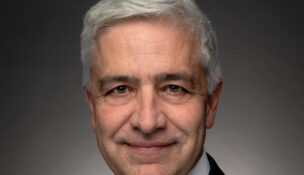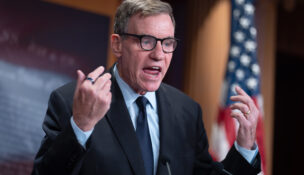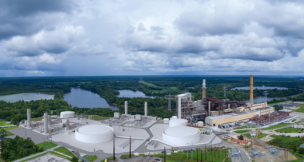Washington Wizards, Capitals reach deal to stay in D.C.
Alexandria arena deal killed with new 2050 D.C. lease
Kate Andrews //March 27, 2024//

From left: Washington, D.C., Mayor Muriel Bowser, D.C. City Council Chairman Phil Mendelson and Monumental Sports & Entertainment CEO Ted Leonsis speak March 27, 2024, at the Capital One Arena in Washington, D.C.

From left: Washington, D.C., Mayor Muriel Bowser, D.C. City Council Chairman Phil Mendelson and Monumental Sports & Entertainment CEO Ted Leonsis speak March 27, 2024, at the Capital One Arena in Washington, D.C.
Washington Wizards, Capitals reach deal to stay in D.C.
Alexandria arena deal killed with new 2050 D.C. lease
Kate Andrews //March 27, 2024//
The Washington Wizards and Capitals NBA and NHL teams are staying put in the District of Columbia and will not be moving to Alexandria, according to announcements from Washington, D.C., and Virginia officials Wednesday. These events put the final nail in the coffin of a controversial $2 billion Alexandria arena proposal touted by Virginia Gov. Glenn Youngkin.
“We’re going to be together for a long time,” Washington, D.C., Mayor Muriel Bowser said at a news conference Wednesday evening, joined by Monumental Sports & Entertainment CEO Ted Leonsis.
Bowser said that she and Leonsis had just signed an agreement to keep the teams in Washington through 2050, in exchange for D.C.’s pledge to pay $515 million over the next three years to upgrade and modernize Capital One Arena in downtown D.C.
According to Leonsis, he and Bowser continued discussions regularly after his and Youngkin’s December 2023 announcement of the proposal to create a $2 billion arena and entertainment district in Alexandria — a nonbinding deal that was opposed by some Virginia Democratic lawmakers and Alexandria residents.
Youngkin, whose efforts to build the arena were blocked by Virginia State Senate Democrats during the General Assembly session, said in a statement Wednesday afternoon that “personal and political agendas drove away a deal with no upfront general fund money and no tax increases, that [would have] created tens of thousands of new jobs and billions in revenue for Virginia.”
He also referred to the possibility of 30,000 new jobs and $12 billion in economic activity that the deal could have brought to the state, which “just went up in smoke,” according to the statement.
“This should have been our deal and our opportunity,” the governor continued. “All the General Assembly had to do was say, ‘Thank you, Monumental, for wanting to come to Virginia and create $12 billion of economic investment. Let’s work it out.'”
The proposed sports arena and entertainment district faced significant pushback from state Sen. Louise Lucas, the powerful chair of the Senate Finance & Appropriations Committee, who prevented the Virginia State Senate from voting on a measure to create a state authority that would control the project’s approximate $1.3 billion in public funding.
Answering a reporter’s question about what had happened with the Virginia negotiations and opposition among state lawmakers, Leonsis didn’t speak specifically about the state Senate’s roadblocks or any other missteps among state officials.
But D.C. officials “did everything right from December on. And when I looked at the other side of the board,” Leonsis said, referring to Virginia, “some of them weren’t scoring as high, and they weren’t together.
“We are an incredibly valuable company,” he added. “Forbes just said we’re worth $6 billion. That would make us one of the 10 most valuable companies in Virginia, one of the 10 most valuable companies in Washington, D.C., [and] we should be treated with that kind of respect. The city [of Washington] treated us that way. And that really was what the game changer for us.”
Leonsis said at the news conference that he would talk about Virginia at a later time, but he complimented Youngkin as “a good man,” who was aware of his ongoing negotiations with Bowser.
At the news conference, held Wednesday evening at Capital One Arena, Leonsis said that in recent months, he and Bowser met nearly weekly on the “main couch in the lobby at the Waldorf, and I would jump up and run to the bar and get some drinks, and we would talk about what’s the vision for the city.”
The option of more space
Another key factor in D.C.’s negotiations with Monumental was the recent closure of a shopping mall near the current arena. Washington, D.C., officials and the mall’s owner offered to let Monumental expand into about 200,000 square feet of that space, Leonsis said. The 12 acres on the Potomac River, where the arena would have been part of 9 million square feet of new multiuse buildings, was part of that proposal’s appeal, he added.
Lucas opposed the amount of public spending on the arena — saying that schools and toll relief should be higher priorities for the state — and tweeted Wednesday afternoon, “As Monumental announces today they are staying in Washington, D.C., we are celebrating in Virginia that we avoided the Monumental Disaster! Thank you to everyone who stood with us in this fight!”
Other Virginia Democrats took Lucas’ side in the battle, and some were put off by the governor’s apparent lack of interest in compromising on their party’s priorities, including a $15/hour minimum wage starting in 2026 and setting up a recreational cannabis retail structure in the state.
Matt Kelly, CEO of Bethesda, Maryland-based developer JBG Smith, which would have developed the entertainment district, released a statement Wednesday, blaming the project’s failure on “partisan politics and, most troubling, the influence of special interests and potential pay-to-play influences within the Virginia legislature.
“The scheming and special interests that plagued this opportunity in the Virginia legislature will no doubt cause future employers and the next Monumental to question whether their opportunity will get a fair hearing,” Kelly’s statement continued.
“This opportunity also brought with it the potential to add tens of thousands of jobs and needed housing units, including 1,000 units of affordable housing preservation in Alexandria which we had pledged as part of the arena proposal. Traffic and transportation investments, including possible Metro funding, are also likely gone. Instead, the existing surface-parked, single-story shopping center on the site will remain through the remaining 20-year term of the Target lease, and development on the remaining land will likely be far less dense. To say we are disappointed is an understatement; we are disgusted with the backroom-dealing and opaque scheming that took place as this played out.”
Last week, JBG Smith pledged to double the number of preserved workforce-priced affordable residential units near the complex from 500 residences to 1,000, an attempt to save the deal, and previously, the governor put forward a $322 million Hampton Roads toll relief proposal, a priority for Lucas.
In February, George Mason University’s Center for Regional Analysis found in a study requested by JBG Smith Properties that the project would include the construction of 5,405 workforce-affordable housing units, more than twice the 2,250 affordable housing units the City of Alexandria aims to have by 2030.
The Democratic-controlled House of Delegates passed the authority legislation in a bipartisan vote during the General Assembly’s regular session, but the bill faced a roadblock in the Senate. Some Alexandria residents also opposed the project over costs, traffic and infrastructure stress.

Big numbers touted
In December 2023, Youngkin and Leonsis, with Mayor Wilson on hand, announced the 9 million-square-foot entertainment campus project as close to a done deal, saying it could create up to 30,000 jobs for Virginia over several decades. With a 2025 groundbreaking, the arena was expected to be completed by 2028 on an accelerated construction schedule, and an economic and fiscal impact report conducted for the city anticipated up to $7.96 billion in annual economic output for the state if the arena was open by 2028.
However, in March, The Washington Post reported that a separate economic analysis commissioned by the Youngkin administration and not released publicly had assumed fans would pay $75 for parking and that a new luxury hotel would book rooms at $731 a night, with the state using parking fees, ticket taxes and other revenue in order to pay off $1.5 billion in debt.
Earlier this month, Bowser said the District’s offer to fast-track a $500 million deal to update the teams’ current arena and keep them in Washington, D.C., was still on the table, after Virginia legislators omitted the authority wording from their budget amendments — a decision Youngkin called a “colossal mistake.”
“As stewards of the city’s economic health and development, city leaders believed the Potomac Yard entertainment district opportunity was worthy of community discussion and [city council] consideration,” Wilson said in a statement Wednesday. “We negotiated a framework for this opportunity in good faith and participated in the process in Richmond in a way that preserved our integrity. We trusted this process and are disappointed in what occurred between the governor and General Assembly.”
The 2024-26 state budget negotiations between state lawmakers and Youngkin remained the final avenue to create the state authority by including it in the finalized budget in April, but Wednesday’s events closed the door entirely on the proposed arena move.
S
















